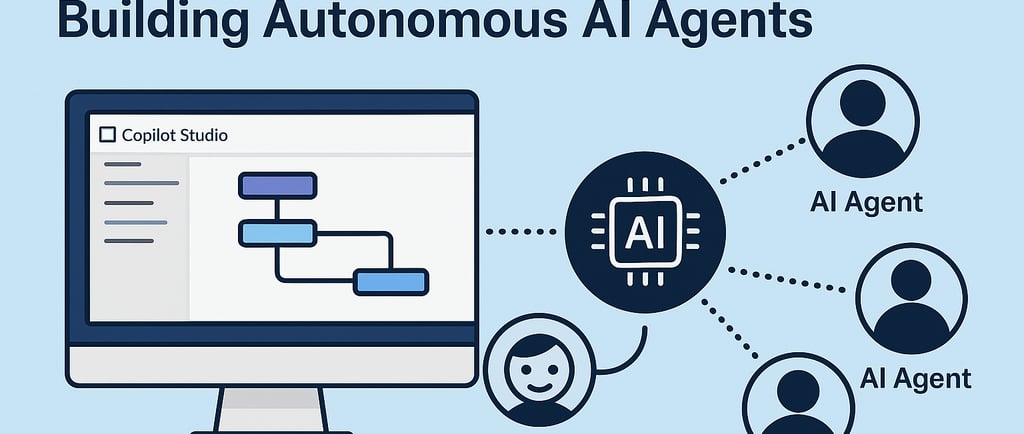Microsoft’s Push Toward Autonomous AI Agents: A New Era of Business Automation
Microsoft is launching tools next month that allow businesses to build autonomous AI agents using its low-code Copilot Studio platform, aiming to streamline operations like client communication, inventory management, and expense tracking. These agents operate with minimal human input and are designed to integrate seamlessly into everyday workflows, leveraging AI models from Microsoft and OpenAI. Despite growing investor pressure and slow enterprise adoption, Microsoft is positioning these agents as the future of workplace automation.
WORKAGENTS
The AI Maker
5/22/20252 min read


As artificial intelligence continues to evolve at breakneck speed, Microsoft is taking a bold step forward by introducing tools that allow customers to build autonomous AI agents—software programs that can operate with minimal human input. This move reflects a growing industry shift from reactive chatbots to proactive, intelligent systems capable of managing complex business functions. Starting next month, Microsoft customers will be able to use these agents to handle tasks such as customer queries, sales lead generation, and inventory management.
Unlike traditional chatbots, autonomous agents are designed to act independently within pre-set boundaries, essentially functioning as task-specific AI applications. Microsoft is positioning these agents as a core part of the AI-first enterprise stack—referring to them as "apps for an AI-driven world." This vision is centered on enabling companies to deploy AI across multiple departments without requiring deep technical expertise or major infrastructure overhauls.
At the heart of this offering is Copilot Studio, a low-code platform that simplifies the creation of AI agents. Leveraging models built by both Microsoft and OpenAI, the tool empowers even non-technical users to build and deploy customized agents. Microsoft plans to release this capability in public preview starting in November, accompanied by a set of 10 pre-built agents designed to tackle routine business processes such as supply chain management, expense tracking, and customer communication.
To illustrate the practical potential of these tools, Microsoft partnered with consulting firm McKinsey & Co during the early access phase. In their demo, McKinsey built an agent capable of managing client inquiries by analyzing historical interactions, assigning the right consultant, and scheduling follow-up meetings. This kind of autonomous coordination was previously the domain of human teams—now, it's becoming automatable.
Charles Lamanna, Corporate Vice President of Business and Industry Copilot at Microsoft, explained the broader vision: “Every employee will have a Copilot, their personalized AI agent, and then they will use that Copilot to interface and interact with the sea of AI agents that will be out there.” This signals a future where AI not only augments individual productivity but also serves as the primary interface between humans and complex systems.
Despite these ambitious plans, Microsoft and other tech companies are under pressure to demonstrate clear returns on their multibillion-dollar AI investments. While Microsoft’s stock performance remains strong for the year, a recent dip has raised questions among investors about the commercial traction of tools like Copilot. Gartner’s August survey added fuel to the fire, revealing that most IT departments have yet to move beyond the pilot stage with Copilot deployments.
Even so, the introduction of customizable, autonomous agents marks a significant step in making AI not just more accessible, but more actionable. By reducing the barrier to entry and focusing on real business value, Microsoft is hoping to accelerate adoption and prove that AI can do more than generate headlines—it can deliver operational transformation.
As enterprises begin to explore this new frontier, the success of these agents will hinge on ease of use, clear ROI, and their ability to integrate seamlessly into everyday workflows. The race to define the AI-powered workplace is on, and Microsoft is betting big on autonomy.
Your Data, Your Insights
Unlock the power of your data effortlessly. Update it continuously. Automatically.
Answers
Sign up NOW
info at aimaker.com
© 2024. All rights reserved. Terms and Conditions | Privacy Policy
